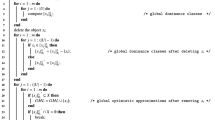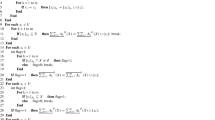Abstract
The approximation space in rough set theory is important for dealing with uncertainties. As the information contained in various information systems is constantly updated and changed with the development of information technology, how to effectively obtain the approximation space in dynamic environments is essential. The local rough set as an excellent model avoids unnecessary calculation of information granules, and can significantly improve learning efficiency. In this paper, we mainly investigate a dynamic approximation update mechanism of multigranulation data from local viewpoint. We first define a support and inclusion function to construct local generalized multigranulation neighborhood rough set model. Then, the dynamic updating process of global rough set and local rough set is analyzed when object chandes. Meanwhile, the corresponding dynamic update algorithms for dynamic objects are proposed based on local generalized multigranulation rough set model. The complexity analysis about them theoretically proves the efficiency of local dynamic algorithm compared with global algorithm and static algorithm. To illustrate the effectiveness of proposed algorithms, twelve datasets from UCI are adopted to contrast experiments.







Similar content being viewed by others
References
Chen H, Li T, Cai Y et al (2016) Parallel attribute reduction in dominance-based neighborhood rough set. Inf Sci 373:351–368
Dua D, Graff C (2019) UCI Machine Learning Repository http://archive.ics.uci.edu/ml. Irvine, CA: University of California, School of Information and Computer Science
Fujita H, Gaeta A, Loia V et al (2020) Hypotheses analysis and assessment in counterterrorism activities: a method based on OWA and fuzzy probabilistic rough sets. IEEE Trans Fuzzy Syst 28(5):831–845
Fujita H, Gaeta A, Loia V et al (2019) Resilience analysis of critical infrastructures: a cognitive approach based on granular computing. IEEE Trans. Cybern. 49(5):1835–1848
Guo Y, Tsang ECC, Xu W, Chen D (2019) Local logical disjunction double-quantitative rough sets. Inf Sci 500:87–112
Jiang Z, Liu K, Yang X et al (2020) Accelerator for supervised neighborhood based attribute reduction. Int J Approx Reason 119:122–150
Ju H, Ding W, Yang X et al (2021) Robust supervised rough granular description model with the principle of justifiable granularity. Appl Soft Comput 110:107612
Kong Q, Zhang X, Xu W et al (2020) Attribute reducts of multi-granulation information system. Artif Intell Rev 53(2):1353–1371
Li W, Xu W, Zhang X et al (2021) Updating approximations with dynamic objects based on local multigranulation rough sets in ordered information systems. Artif Intell Rev, https://doi.org/10.1007/s10462-021-10053-9
Li W, Xue X, Xu W et al (2020) Double-quantitative variable consistency dominance-based rough set approach. Int J Approx Reason 124:1–16
Lin B, Zhang X (2019) Relative reduction of incomplete interval-valued decision information systems associated with evidence theory. J Inf Sci Eng 35(6):1377–1396
Liu K, Yang X, Fujita H et al (2019) An efficient selector for multi-granularity attribute reduction. Inf Sci 505:457–472
Luo S, Miao D, Zhang Z et al (2020) A neighborhood rough set model with nominal metric embedding. Inf Sci 520:373–388
Pawlak Z (1998) Rough set. Int J Comput Inf Sci 11(5):341–356
Qian Y, Liang X, Lin G et al (2017) Local multigranulation decision-theoretic rough sets. Int J Approx Reason 82:119–137
Qian Y, Liang X, Wang Q et al (2018) Local rough set: a solution to rough data analysis in big data. Int J Approx Reason 97:38–63
Qian Y, Liang J, Yao Y, et a. l. (2010) MGRS: A multi-granulation rough set. Inf Sci 180(6):949–970
Wang Q, Qian Y, Liang X et al (2018) Local neighborhood rough set. Knowl-Based Syst 153:53–64
Xu W, Guo Y (2016) Generalized multigranulation double-quantitative decision-theoretic rough set. Knowl-Based Syst 105:190–205
Xu W, Li W (2016) Granular computing approach to two-way learning based on formal concept analysis in fuzzy datasets. IEEE Trans Cybern 46(2):366–379
Xu W, Li W, Zhang X (2017) Generalized multigranulation rough sets and optimal granularity selection. GrC 2(4):271–288
Xu W, Sun W, Zhang X et al (2012) Multiple granulation rough set approach to ordered information systems. Int J Gen Syst 41(5):475–501
Xu W, Wang Q, Zhang X (2013) Multi-granulation rough sets based on tolerance relations. Soft Comput 17(7):1241–1252
Xu W, Yu J (2017) A novel approach to information fusion in multi-source datasets: a granular computing viewpoint. Inf Sci 378:410–423
Yang X, Li T, Liu D et al (2020) A multilevel neighborhood sequential decision approach of three-way granular computing. Inf Sci 538:119–141
Yang X, Li T, Liu D et al (2017) A unified framework of dynamic three-way probabilistic rough sets. Inf Sci 420:126–147
Yang W, Pawlak Z et al (1982) MGRS: A multi-granulation rough set. J Inform Technol 12(3):341–356
Yang L, Xu W, Zhang X et al (2020) Multi-granulation method for information fusion in multi-source decision information system. Int J Approx Reason 122:47–65
Yang L, Zhang X, Xu W et al (2019) Multi-granulation rough sets and uncertainty measurement for multi-source fuzzy information system. Int J Fuzzy Syst 21(6):1919–1937
Yu J, Chen M, Xu W (2017) Dynamic computing rough approximations approach to time-evolving information granule interval-valued ordered information system. Appl Soft Comput 60:18–29
Yuan K, Li W, Xu W et al (2021) A comparative experimental evaluation on performance of type-1 and interval type-2 Takagi-Sugeno fuzzy models. Int J Mach Learn Cyb 12:2135–2150
Zhang X, Gou H, Lv Z et al (2021) Double-quantitative distance measurement and classification learning based on the tri-level granular structure of neighborhood system. Knowl-Based Syst 217:106799
Zhang C, Li D, Zhai Y et al (2019) Multigranulation rough set model in hesitant fuzzy information systems and its application in person-job fit. Int J Mach Learn Cyb 10(4):717–729
Zhang X, Yao H, Lv Z et al (2021) Class-specific information measures and attribute reducts for hierarchy and systematicness. Inf Sci 563:196–225
Zhang J, Zhang X, Xu W (2018) Lower approximation reduction based on discernibility information tree in inconsistent ordered decision information systems. Symmetry 10(12):696
Zhang J, Zhang X, Xu W et al (2019) Local multigranulation decision-theoretic rough set in ordered information systems. Soft Comput 23(24):13247–13261
Zhou J, Lai Z, Miao D et al (2020) Multigranulation rough-fuzzy clustering based on shadowed sets. Inf Sci 507:553–573
Acknowledgements
This paper is supported by the National Natural Science Foundation of China (Nos.61976245, 61472463, 61772002) and the Fundamental Research Funds for the Central Universities (No. XDJK2019B029).
Author information
Authors and Affiliations
Corresponding author
Additional information
Publisher’s note
Springer Nature remains neutral with regard to jurisdictional claims in published maps and institutional affiliations.
Rights and permissions
About this article
Cite this article
Xu, W., Yuan, K. & Li, W. Dynamic updating approximations of local generalized multigranulation neighborhood rough set. Appl Intell 52, 9148–9173 (2022). https://doi.org/10.1007/s10489-021-02861-x
Accepted:
Published:
Issue Date:
DOI: https://doi.org/10.1007/s10489-021-02861-x




